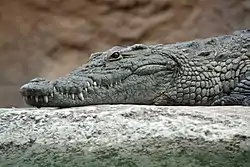古東斯拉夫語
其他形式
- (korkodilŭ), (karkodilŭ), (korkodil)
詞源
借自古希臘語 (korkódilos)、 (krokódeilos)。
名詞
(korkodilŭ) m
派生語彙
- 古盧森尼亞語: (korkodíl)
- 中古俄語: (korkodíl), (korkodě́l)
- 俄語: (korkodíl) (方言)[1]
參考資料
- ↑ Vasmer, Max (1964–1973), “”, [俄語語源詞典] (俄語), 譯自德語並由Oleg Trubačóv增補, 莫斯科: Progress
延伸閱讀
- Sreznevsky, Izmail (1893), “”, Матеріалы для Словаря древне-русскаго языка по письменнымъ памятникамъ [Materials for the Dictionary of the Old East Slavic Language According to Written Monuments] (俄語), 卷1: – , Saint Petersburg: Department of Russian Language and Literature of the Imperial Academy of Sciences, 页1288
- Template:R:orv:SDRJa
- Template:R:ru:SRJa1117
古盧森尼亞語

其他形式
- (korkodél)
詞源
繼承自古東斯拉夫語 (korkodilŭ),借自古希臘語 (korkódilos)、 (krokódeilos)。 (krokodíl)的同源對似詞。
名詞
(korkodíl) m 有生 (關係形容詞)
- 鱷魚
- 近義詞: (krokodíl)
延伸閱讀
- Bulyka, A. M., editor (1997), “”, Гістарычны слоўнік беларускай мовы [Historical Dictionary of the Belarusian Language] (白俄羅斯語), Minsk: Belaruskaia navuka, ISBN 985-08-0053-4, 页162
This article is issued from Wiktionary. The text is licensed under Creative Commons - Attribution - Sharealike. Additional terms may apply for the media files.